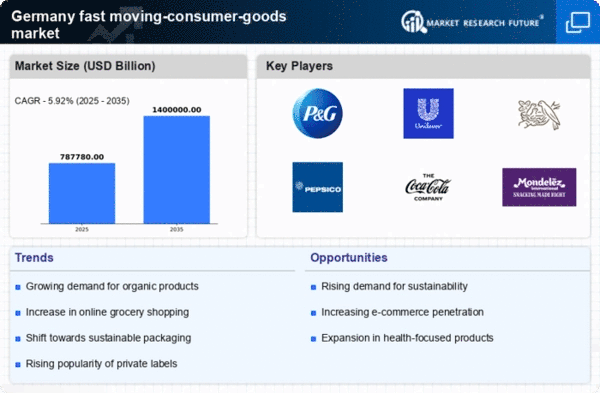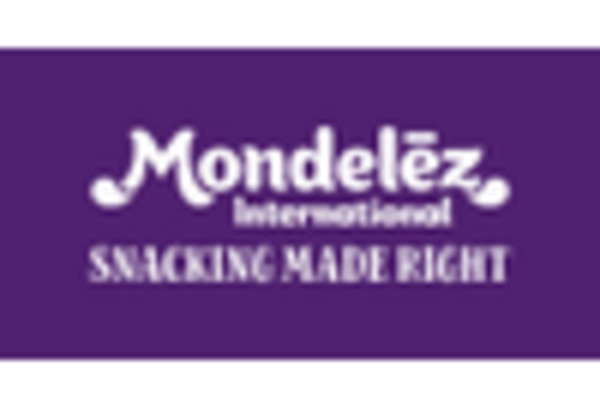Rising Disposable Income
The fast moving-consumer-goods market in Germany is experiencing a notable increase in disposable income among consumers. As economic conditions improve, households are allocating more funds towards non-essential goods. This trend is reflected in the rising demand for premium products, which has seen a growth of approximately 15% in the last year. Consumers are increasingly willing to spend on high-quality items, which is reshaping the competitive landscape of the fast moving-consumer-goods market. Retailers are responding by diversifying their product offerings to cater to this affluent segment, thereby enhancing their market presence. This shift not only boosts sales but also encourages innovation in product development, as companies strive to meet the evolving preferences of a more affluent consumer base.
Changing Consumer Preferences
The fast moving-consumer-goods market in Germany is witnessing a shift in consumer preferences, particularly towards organic and natural products. This trend is driven by an increasing awareness of health and environmental issues among consumers. Recent surveys indicate that approximately 40% of consumers are actively seeking out organic options, leading to a substantial rise in sales of organic goods. Retailers are responding by expanding their product lines to include more organic and sustainably sourced items. This shift not only reflects changing consumer values but also presents opportunities for brands to differentiate themselves in a competitive market. As the demand for transparency and ethical sourcing grows, companies in the fast moving-consumer-goods market must adapt to these evolving preferences.
Urbanization and Lifestyle Changes
Urbanization continues to play a pivotal role in shaping the fast moving-consumer-goods market in Germany. As more individuals migrate to urban areas, lifestyle changes are evident, leading to increased demand for convenience-oriented products. The fast-paced urban lifestyle has resulted in a surge in ready-to-eat meals and on-the-go snacks, with sales in these categories rising by 20% over the past year. This shift indicates a growing preference for products that align with busy schedules, prompting manufacturers to innovate and adapt their offerings. Additionally, urban consumers are more likely to engage with brands that provide quick and efficient shopping experiences, further influencing the dynamics of the fast moving-consumer-goods market.
Technological Advancements in Retail
Technological advancements are significantly impacting the fast moving-consumer-goods market in Germany. The integration of digital technologies in retail, such as artificial intelligence and data analytics, is enhancing the shopping experience for consumers. Retailers are leveraging these technologies to personalize marketing strategies, optimize inventory management, and streamline supply chains. For instance, the use of AI-driven recommendation systems has led to a 25% increase in online sales for many brands. Furthermore, the rise of mobile shopping applications is facilitating easier access to products, thereby driving growth in the fast moving-consumer-goods market. As technology continues to evolve, it is likely to further transform consumer interactions and purchasing behaviors.
Increased Competition and Market Consolidation
The fast moving-consumer-goods market in Germany is characterized by increased competition and ongoing market consolidation. Major players are acquiring smaller brands to expand their portfolios and enhance market share. This trend is evident as larger companies seek to diversify their offerings and tap into niche markets. The competitive landscape is further intensified by the entry of new players, which is driving innovation and price competition. Recent data suggests that the top five companies now account for over 60% of market share, indicating a trend towards consolidation. This dynamic environment compels companies to continuously innovate and improve their value propositions to maintain relevance in the fast moving-consumer-goods market.

















